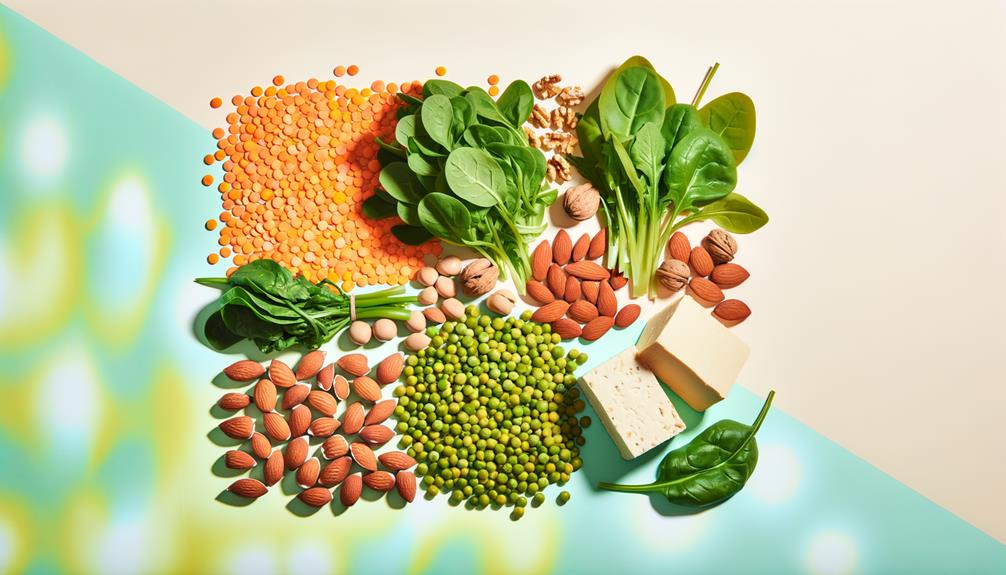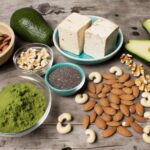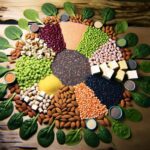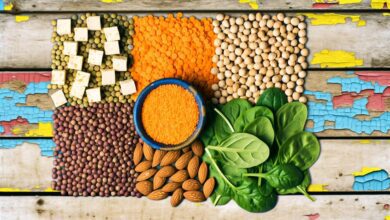Imagine you’re sipping on a smoothie brimming with spirulina and hemp seeds, ingredients celebrated for their protein content and skin-boosting properties. You’re already taking strides toward a radiant complexion without relying on animal products. You understand that the secret to glowing skin isn’t just in the creams and serums you apply; it’s largely in the cruelty-free foods you choose to consume. As you seek out protein sources that align with a compassionate lifestyle, you may wonder how these plant-based options stack up against their animal-derived counterparts. In the following discussion, we’ll explore how these vegan proteins not only meet your nutritional needs but also offer a symphony of skin benefits. And along the way, you’ll discover how adopting such a diet can reflect both your ethical stance and your cultural identity, without sacrificing taste or efficacy. Now, let’s consider how you can harness the power of these proteins to reveal your best skin yet.
Key Takeaways
- Consuming a variety of plant-based protein sources is crucial for optimal skin health.
- Quinoa, pulses, tofu, nuts, and seeds are excellent protein sources that promote radiant skin.
- Combining different plant-based proteins ensures the intake of essential amino acids for healthy skin.
- Including omega-3 fatty acids from sources like flaxseeds and walnuts helps keep the skin supple and moisturized.
Nutritional Science Behind Protein
Understanding the nutritional science behind protein is key to appreciating how these vital nutrients support your skin’s health and overall well-being. Proteins are the building blocks of life, breaking down into 22 amino acids, including 9 essential amino acids your body can’t produce on its own. You must obtain these through your diet to ensure adequate levels for maintaining healthy skin and a robust immune system.
A balanced intake of essential nutrients, particularly complete proteins that contain all essential amino acids, is crucial. While you may associate high amounts of protein with animal products, there are abundant plant-based protein sources that offer benefits for your skin without the potential downsides to bone health and kidney function. By consuming a variety of grains, legumes, nuts, and seeds, you’re not only nurturing your body with compassion but also promoting cultural awareness through diverse cuisines.
For an average adult, the Reference Nutrient Intake suggests 0.75g of protein per kg of bodyweight each day. This isn’t just about quantity; it’s about quality and kindness. Embrace plant-based proteins to achieve the protein per day needed for radiant, healthy skin, while serving others and the planet with your dietary choices.
Optimal Vegan Protein Sources
To nourish your skin and honor the Earth, consider incorporating quinoa, a complete protein, into your vegan meals. Quinoa isn’t just a high source of protein; it’s also steeped in cultural significance and is gentle on the planet. In your quest for a radiant complexion, you’re not just caring for yourself but for the larger world as well.
Vegan diets thrive on diversity, and plant-based protein comes in many forms. Pulses, like beans, peas, and lentils, are not just sources of protein, but stories in every culture’s cookbook. Tofu, a staple in many Asian cuisines, offers a canvas for your culinary creativity while being a pillar of protein.
Here’s a guide to some of the best plant-based proteins to enrich your meals:
| Protein Source | Protein per 100g |
|---|---|
| Quinoa | 4g |
| Pulses | 7-10g |
| Tofu | 8g |
| Nuts and Seeds | Varies |
| Chia Seeds | 17g |
Preparing Protein-Packed Meals
As you explore the rich tapestry of plant-based proteins, let’s focus on how to craft these ingredients into delicious, protein-packed meals that will nourish your skin and your spirit. To ensure you’re getting enough protein, vary your sources. Combine different plant-based foods like legumes, whole grains, and seeds to cover all essential amino acids. This approach not only offers a variety of types of protein but also introduces a spectrum of flavors and textures to your meals.
You don’t need to rely solely on animal products like plain Greek yogurt to meet your protein needs. Plant-based proteins can be just as effective. For example, consider a high-protein diet that includes a generous spread of peanut butter on whole-grain toast, or a salad sprinkled with a handful of nuts. These are not only rich in protein but provide healthy fats that are vital for glowing skin.
Use a protein calculator to determine the precise amount of protein you require daily, which will guide you in preparing balanced meals. Remember, a cruelty-free approach doesn’t mean compromising on nutrition; it’s about being mindful and creative with your food choices, serving both your body and the planet with every bite.
Skin Benefits of Plant Proteins
Feasting on plant proteins like almonds, tofu, and lentils can lead to healthier, more resilient skin, combatting common concerns such as acne and eczema. These protein-rich foods are not just essential for your overall health; they’re also a high source of nutrients that help improve skin texture and radiance. When you incorporate a variety of these sources into your diet, you’re nourishing your body with the kindness it deserves.
By choosing plant-based proteins, you’re supporting a compassionate lifestyle that respects cultural diversity and the well-being of all living creatures. Goji berries, for instance, aren’t just exotic fruits; they’re tiny powerhouses that can reduce the severity of wrinkles, while walnuts, packed with omega-3 fatty acids, support the skin’s barrier function.
Here’s a helpful table for you to explore the skin benefits of some protein-packed plants:
| Food Source | Skin Benefit |
|---|---|
| Almonds | Reduces acne; promotes elasticity |
| Tofu | Supports cell repair; maintains firmness |
| Lentils | Aids in combating eczema; enhances glow |
| Goji Berries | Diminishes wrinkles; fights aging |
| Walnuts | Strengthens skin barrier; reduces inflammation |
Balancing a Vegan Skin Diet
Embracing a vegan skin diet means thoughtfully combining various plant-based proteins to ensure your skin receives all the essential amino acids it craves for that natural radiance. Your nutrition and lifestyle choices deeply impact your skin health, making a balanced diet rich in vitamins and minerals essential for skin vitality.
Include protein-rich foods such as nuts, seeds, and legumes in your daily intake, as they’re a great source of protein that supports the repair and regeneration of your skin cells. Foods like quinoa and pulses not only provide protein but are also packed with other nutrients beneficial for maintaining glowing skin. Varying these protein sources ensures a well-rounded intake of the necessary building blocks for a healthy diet.
Don’t forget that fats are crucial too, especially omega-3 fatty acids found in flaxseeds and walnuts, which help keep your skin supple and moisturized. Integrating these elements with compassion and awareness of their origins honors both your body and the environment. As you serve others and yourself, remember that the path to glowing skin is paved with the choices you make at every meal. A cruelty-free approach to beauty starts on your plate, reflected in the vibrant health of your skin.
Frequently Asked Questions
What Is the Best Food for Radiant Skin?
For radiant skin, chia seeds are a superhero, offering hydration benefits, omega-rich goodness, and collagen boosters, all essential for a balanced diet that nurtures your skin and serves your compassionate lifestyle.
What Are Protein Rich Foods for Skin?
You’ll find protein in quinoa benefits, almond snacks, and various tofu types. Lentil soup, chia seeds, and hemp boost your intake while tempeh nutrition, spirulina advantage, nutritional yeast, and edamame snacks round out your choices.
Which Protein Is Best for Glowing Skin?
Imagine your skin as a garden, thriving with the right balance of nutrients. For glowing skin, plant-based proteins like soy optimize collagen synthesis, offer antioxidant protection, and support hydration, elasticity, and hormonal balance.
What Is the Best Protein for Skin Repair?
For skin repair, you’ll want to focus on vegan protein sources that boost collagen synthesis, like tofu and lentils, which offer amino acid benefits and support cellular regeneration for a compassionate, antioxidant-rich diet.







